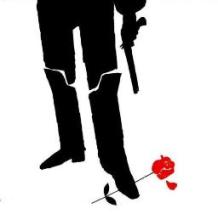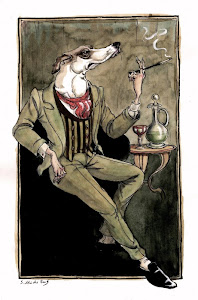 INTERVIEWER: And what do you think of this Anglo-Saxon world?
INTERVIEWER: And what do you think of this Anglo-Saxon world?HOUELLEBECQ: You can tell that this is the world that invented capitalism. There are private companies competing to deliver the mail, to collect the garbage. The financial section of the newspaper is much thicker than it is in French papers.
The other thing I’ve noticed is that men and women are more separate. When you go into a restaurant, for example, you often see women eating out together. The French from that point of view are very Latin. A single-sex dinner would be considered boring. In a hotel in Ireland, I saw a group of men talking golf at the breakfast table. They left and were replaced by a group of women who were discussing something else. It’s as if they’re separate species who meet occasionally for reproduction. There was a line I really liked in a novel by Coetzee. One of the characters suspects that the only thing that really interests his lesbian daughter in life is prickly-pear jam. Lesbianism is a pretext. She and her partner don’t have sex anymore, they dedicate themselves to decoration and cooking.
Maybe there’s some potential truth there about women who, in the end, have always been more interested in jam and curtains.
Michel Houellebecq, Paris Review No. 194, Autumn 2010





















9 comments:
I enjoyed this and the nordic soul post very much. Have a great weekend!
Pretentious frog sleazebag, "full of sound and fury, signifying nothing."
Haha Ian Dundrillon, there are still people to call French, frogs! You Anglo Saxon really need to get a grip!
The last line is classic, I think he's on to something.
"You Anglo Saxon [sic] really need to get a grip!"
As a WASP, by definition and design, I have a 'grip'and that is not in question, please and thank you.
"France: a lovely little country, unfortunately populated by all those pesky French people."
John Larroquette
"Come back and I shall taunt you a
second time."
Monty Python
Oh dear Admiral, sounds like the end of a love affair...
Hey Ian, you surely speak French or at least you wish you did but anyway just to cut it short here's the opinion of a German on the England/France rivalry :
Il ne faut pas oublier qu’une fois déjà les Anglais, par le fait de leur profonde médiocrité, ont déterminé une dépression générale de l’esprit en Europe: ce qu’on appelle « les idées modernes » ou « les idées du XVIIIe siècle », ou encore « les idées françaises », tout ce contre quoi l’esprit allemand s’est levé avec un profond dégoût, tout cela est incontestablement d’origine anglaise. Les Français ne furent que les imitateurs et les acteurs de ces idées, comme ils en furent les meilleurs soldats et malheureusement aussi les premières et les plus complètes victimes: car à la maudite anglomanie des « idées modernes » l’âme française a finir par s’appauvrir et s’émacier au point qu’aujourd’hui ses XVIe et XVIIe siècles, son énergie profonde et ardente, la distinction raffinée de ses créations ne sont plus qu’un souvenir à peine croyable. Mais, contre la mode d’aujourd’hui et contre les apparences, il faut défendre cette position qui est de simple honnêteté historique et ne pas en démordre: tout ce que l’Europe a connu de noblesse – noblesse de la sensibilité, du goût, des moeurs, noblesse en tous sens élevés du mot -, tout cela est l’oeuvre et la création propre de la France; et la vulgarité européenne, la médiocrité plébéienne des idées modernes est l’oeuvre de l’Angleterre.”
Nietzsche, « Par delà le bien et le mal
Anon @17:41 ~ Oh well. These things never last anyway.
Ian ~ I've replied to your query of 10 August at the 'Fairbanks' column. Hope it helps...
Wer würde je lesen oder zitieren Nietzsche in Französisch. Das ist unzivilisiert.
"Das Übermensch könnte niemals sein Französisch. Es ist nicht in ihrer Natur."
Fredrich Nietzsche
Also Sprach Zarathustra
1883
Ecce Homo: Wie man wird, was man ist
1888
Post a Comment